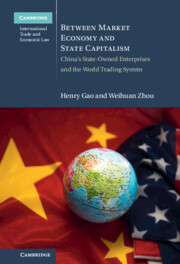 Between Market Economy and State Capitalism
Between Market Economy and State Capitalism Book contents
- Between Market Economy and State Capitalism
- Cambridge International Trade and Economic Law
- Between Market Economy and State Capitalism
- Copyright page
- Contents
- Figures and Tables
- Foreword
- Preface and Acknowledgements
- Table of Cases
- Abbreviations
- 1 China, State Capitalism and the World Trading System
- 2 The Evolution of China’s Reforms of State-Owned Enterprises (1978–2020)
- 3 State Capitalism in China’s Accession to the WTO
- 4 The Limits of General WTO Rules
- 5 The Potential of WTO Rules on Industrial Subsidies and China-Specific Obligations
- 6 Emerging Approaches to Regulating State-Owned Enterprises
- 7 Tackling China’s State Capitalism
- 8 Conclusion
- Index
8 - Conclusion
The Potential of Multilateralism
Published online by Cambridge University Press: 10 November 2022
- Between Market Economy and State Capitalism
- Cambridge International Trade and Economic Law
- Between Market Economy and State Capitalism
- Copyright page
- Contents
- Figures and Tables
- Foreword
- Preface and Acknowledgements
- Table of Cases
- Abbreviations
- 1 China, State Capitalism and the World Trading System
- 2 The Evolution of China’s Reforms of State-Owned Enterprises (1978–2020)
- 3 State Capitalism in China’s Accession to the WTO
- 4 The Limits of General WTO Rules
- 5 The Potential of WTO Rules on Industrial Subsidies and China-Specific Obligations
- 6 Emerging Approaches to Regulating State-Owned Enterprises
- 7 Tackling China’s State Capitalism
- 8 Conclusion
- Index
Summary
Chapter 8 summarises the main findings from the preceding chapters, and discusses the best way to deal with the China challenge. Contrary to those who prefer unilateral and plurilateral approaches, we argue that the potential of multilateralism has yet been fully explored. As we have documented, it was the desire to normalise its trade relations within the multilateral framework that prompted China’s initial decision to return to the multilateral trading system. While China did pursue unprecedented market-oriented reform, the potential of the multilateral rules in taming China’s state capitalism has not been fully unleashed since China’s accession. Of course, recognising the potential of multilateralism does not mean that multilateralism is perfect. Instead, we believe that multilateralism is the most promising compared with unilateral measures and bilateral and plurilateral negotiations outlined above. In addition to making fuller use of the existing rules under the WTO, this book has also put forward some approaches for the negotiation of new rules at the multilateral level where such rules are needed and suggested ways to engage China in a more constructive manner.
Keywords
- Type
- Chapter
- Information
- Between Market Economy and State CapitalismChina's State-Owned Enterprises and the World Trading System, pp. 185 - 191Publisher: Cambridge University PressPrint publication year: 2022
